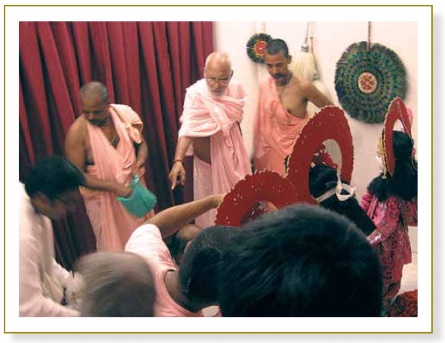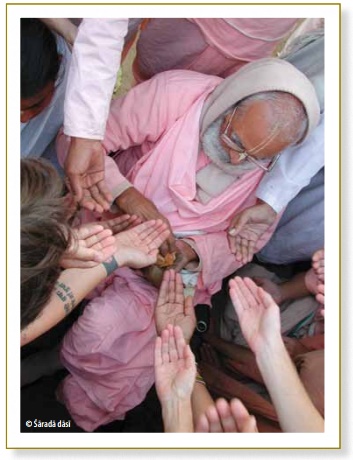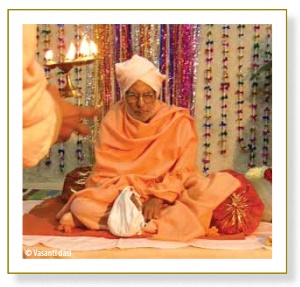Sri Guru Astakam
Gurvāṣṭakam

(Sung by Śeṣaśāyī prabhu)
trāṇāya kāruṇya-ghanāghanatvam
prāptasya kalyāṇa-guṇārṇavasya
vande guroḥ śrī caraṇāravindam (1)
saṁsāra – material existence; dāva – forest; anala – fire; līḍha – afflicted, devoured; loka – people; trāṇāya – to deliver; kāruṇya – of mercy; ghanāghana (ghana-aghana) condensation and liquefication, the quality of a cloud; tvam – you; prāptasya – who has obtained; kalyāṇa – auspicious; guṇa – qualities; arṇavasya – of an ocean; vande – worship; guroḥ – of my gurudeva; śrī – graceful and auspicious; caraṇa-aravindam – the lotus feet.
Just as a cloud extinguishes a blazing forest fire by showering it with rain, so śrī gurudeva, who is an ocean of auspicious qualities, manifests like a condensed cloud which showers the rain of his divine mercy and delivers the living beings scorched by the fire of material existence. I adore the lotus feet of that śrī gurudeva, which are the abode of grace and auspiciousness.
vāditra-mādyan-manaso rasena
romañca-kampāśru-taraṅga-bhājo
vande guroḥ śrī caraṇāravindam (2)

mahāprabhoḥ – of Śrī Caitanya Mahāprabhu; kīrtana – chanting; nṛtya – dancing; gīta – singing; vāditra – playing musical instruments; mādyat – intoxicated, maddened; manasaḥ – whose mind; rasena – due to the mellows of pure devotion; roma-añca – standing of the hair; kampa – quivering of the body; aśru-taraṅga – torrents, waves of tears; bhājaḥ – who experiences; vande – worship; guroḥ – of my gurudeva; śrī – graceful and auspicious; caraṇa-aravindam – the lotus feet.
Dancing, singing and playing musical instruments in saṅkīrtana, śrī gurudeva is perpetually intoxicated as he relishes the divine love of Śrī Caitanya Mahāprabhu in his heart. In this state, he sometimes exhibits ecstatic symptoms and his hairs stand on end, he shivers, and torrents of tears flow from his eyes. I adore the lotus feet of that śrī gurudeva, which are the abode of grace and auspiciousness.
śṛṅgāra-tan-mandira-mārjanādau
yuktasya bhaktāṁś ca niyuñjato ’pi
vande guroḥ śrī caraṇāravindam (3)

śrī-vigraha – the arcā-murti (deities); ārādhana – the worship; nitya – daily; nānā – various; śṛṅgāra – attire and ornaments; tat – of the Supreme Lord; mandira – the temple; mārjana-ādau – in the cleaning and other services; yuktasya – who is himself engaged; bhaktān – his anugata devotees (disciples); ca – and; niyuñjataḥ – who engages; api – also; vande – worship; guroḥ – of my gurudeva; śrī – graceful and auspicious; caraṇa-aravindam – the lotus feet.
Śrī gurudeva himself always worships and serves śrī vigraha, Śrī Śrī Rādhā-Kṛṣṇa, by dressing Them in varieties of exquisite raiments and ornaments that stimulate Their meetings (śṛṅgāra-rasa), by cleansing the temple and by serving Them in so many ways. He also engages his anugata assistants – his disciples – in these services. I adore the lotus feet of that śrī gurudeva, which are the abode of grace and auspiciousness.
svādv-anna-tṛptān hari-bhakta-saṅghān
kṛtvaiva tṛptiṁ bhajataḥ sadaiva
vande guroḥ śrī caraṇāravindam (4)

catuḥ – four; vidha – kinds; śrī – sacred; bhagavat-prasāda – divine mercy of Śrī Bhagavān in the form of His food remnants; svādu – palatable; anna – food grains; tṛptān – spiritually satisfied; hari – Kṛṣṇa; bhakta-saṅghān – the multitude of devotees; kṛtvā – having made; eva – thus; tṛptim – satisfaction; bhajataḥ – who experiences; sadā – always; eva – certainly; vande – worship; guroḥ – of my gurudeva; śrī – graceful and auspicious; caraṇa-aravindam – the lotus feet.
Śrī gurudeva becomes satisfied by satiating Śrī Kṛṣṇa’s devotees with delicious mahāprasāda that is of four kinds: that which is chewed, sucked, licked and drunk. (In other words, by śrī gurudeva having his disciples accept prasāda in a mood of service, their material life is destroyed, and the bliss of divine love awakens within their hearts.) I adore the lotus feet of that śrī gurudeva, which are the abode of grace and auspiciousness.
(Sung by Kṛṣṇa dās prabhu)
mādhurya-līlā-guṇa-rūpa-nāmnām
prati-kṣaṇāsvādana-lolupasya
vande guroḥ śrī caraṇāravindam (5)

śrī-rādhikā – Śrīmatī Rādhikā; mādhavayoḥ – of Śrī Mādhava (Kṛṣṇa); apāra – unlimited; mādhurya – sweetness of; līlā – pastimes; guṇa – qualities; rūpa – forms; nāmnām – of the holy names; prati-kṣaṇa – at every moment; āsvādana – relishing; lolupasya – transcendentally greedy; vande – worship; guroḥ – of my gurudeva; śrī – graceful and auspicious; caraṇa-aravindam – the lotus feet.
At every moment, śrī gurudeva is experiencing intense greed in his heart to taste the unlimited sweetness of the holy names, forms, qualities and pastimes of Śrī Śrī Rādhā-Mādhava in Vṛndāvana. I adore the lotus feet of that śrī gurudeva, which are the abode of grace and auspiciousness.
yā yālibhir yuktir apekṣanīyā
tatrāti-dākṣyād ati-vallabhasya
vande guroḥ śrī caraṇāravindam (6)

nikuñja-yūnaḥ – the Divine Couple’s pastime groves and bowers in Vṛndāvana; rati – amorous love; keli – pastimes; siddhyai – for the perfection; yā yā – whatever; ālibhiḥ – by the sakhīs, or young, female companions; yuktiḥ – arrangements; apekṣaṇīyā – desirable; tatra – in that connection; ati-dākṣyāt – because of being very expert; ati-vallabhasya – who is very dear (to Them); vande – worship; guroḥ – of my gurudeva; śrī – graceful and auspicious; caraṇa-aravindam – the lotus feet.
Śrī gurudeva is expert in executing the arrangements made by the sakhīs for the perfection of Śrī Śrī Rādhā–Kṛṣṇa’s amorous pastimes within the groves of Vṛndāvana, and thus he is very dear to the Divine Couple. I adore the lotus feet of that śrī gurudeva, which are the abode of grace and auspiciousness.
uktas tathā bhāvyata eva sadbhiḥ
kintu prabhor yaḥ priya eva tasya
vande guroḥ śrī caraṇāravindam (7)
sākṣāt – directly; hari-tvena – with the quality of Supreme Lord Śrī Hari; samasta – all; śāstraiḥ – by scriptures; uktaḥ – acknowledged; tathā – thus; bhāvyate – is considered; eva – also; sadbhiḥ – by great saintly persons; kintu – however; prabhoḥ – to the Supreme Lord Śrī Hari; yaḥ – who; priyaḥ – dear; eva – certainly; tasya – of him (śrī guru); vande – worship; guroḥ – of my gurudeva; śrī – graceful and auspicious; caraṇa-aravindam – the lotus feet.
All scriptures proclaim śrī gurudeva to be sākṣāt-hari, non-different from the Lord, and this is acknowledged by all saintly persons. Yet this is because śrī gurudeva is so extremely dear to the Supreme Lord Śrī Hari, being His most confidential servitor (acintya-bhedābheda-prakāśa-vigraha, the inconceivable manifestation who is one with and different from the Lord). I adore the lotus feet of that śrī gurudeva, which are the abode of grace and auspiciousness.
yasyāprasādān na gatiḥ kuto ’pi
dhyāyaṁ stuvaṁs tasya yaśas tri-sandhyaṁ
vande guroḥ śrī caranāravindam (8)

yasya – of whom (śrī guru); prasādāt – by the grace; bhagavat – Kṛṣṇa, the Supreme Lord; prasādaḥ – the mercy; yasya – of whom; aprasādāt – without the grace; na – not; gatiḥ – means of spiritual progress; kutaḥ api – anywhere; dhyāyan – meditating upon; stuvan – praising; tasya – of him (śrī guru); yaśaḥ – the glory; tri-sandhyam – three times a day (the transitional periods of sunrise, noon and sunset); vande – worship; guroḥ – of my gurudeva; śrī – graceful and auspicious; caraṇa-aravindam – lotus feet.
Solely by the mercy of śrī gurudeva one can receive the mercy of Bhagavān Śrī Kṛṣṇa, for without śrī gurudeva’s being pleased, one cannot make any advancement. Meditating on and singing his glories three times a day (in the transitional periods of sunrise, noon and sunset), I adore the lotus feet of that śrī gurudeva, which are the abode of grace and auspiciousness.
brāhme muhūrte paṭhati prayatnāt
yas tena vṛndāvana-nātha-sākṣāt-
sevaiva labhyā januṣo ’nta eva (9)
śrīmat – adorned with grace and auspiciousness; guroḥ – of śrī guru; aṣṭakam – a glorification consisting of eight hymns; etad – this; uccaiḥ – loudly; brāhme muhūrte – in the transcendental time (one hour thirty-six minutes before sunrise); paṭhati – recites; prayatnāt – with great care; yaḥ – whoever; tena – him; vṛndāvana-nātha – the Lord of Vṛndāvana; sākṣāt – direct; sevā – loving service; eva – certainly; labhyā – attains; januḥ – life; anta – at the end; eva – certainly.
That person who, during the transcendental time of brāhma-muhūrta, loudly and attentively recites this aṣṭakam of śrī gurudeva is sure to achieve direct service to the lotus feet of Śrī Kṛṣṇa, the very life and soul of Vṛndāvana, at the end of his life [that is, upon attaining vastu-siddhi, one’s pure spiritual form].
